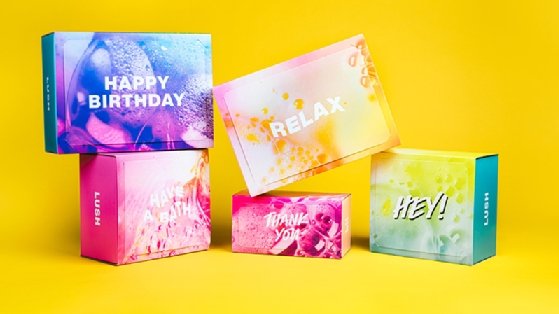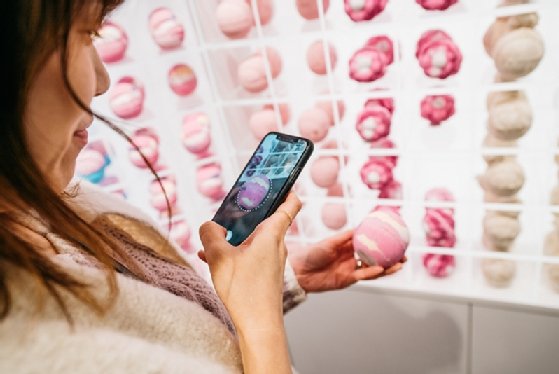
TakumiFukushima/Lush
Lush’s 25-year journey to digital excellence
Retailers are increasingly focused on using technology to better serve customers, but for high street cosmetic brand Lush, tech has always been part of the picture
Over the past 25 years, the fresh and cruelty-free cosmetics retailer Lush has made huge strides as a business, and has gone from opening its first store in Poole, Dorset, in 1995 to having more than 900 shops around the world in 2020, including an “experimental imaginative retail space showcasing Lush’s innovation in technology” in Shinjuku, Tokyo.
One thing the retailer has never compromised on over the past quarter of a century is its ethical and sustainable values – from the products it manufactures through to the way it operates its business and chooses its technology stack.
Speaking to Computer Weekly, Claire Constantine, global retail director at Lush – and daughter of two of the co-founders Mark and Mo Constantine – says Lush is a retailer that operates a little differently to others on the high street.
“We invent our own product, manufacture it and sell it, and we have control over that supply chain to make sure it’s ethical,” she says. “Sometimes we can’t see an ethical alternative, so we try to build that ourselves, and that approach has gone into tech because we’re so used to owning everything – from the idea right the way through to selling it to someone.”
Constantine, who started her career in the family business by joining as a sales assistant in the Covent Garden store in London, says the retailer doesn’t have strict job titles and job descriptions to encourage employees to follow their passion in the hope they may come up with ideas to improve the business.
One area which is full of new ideas is technology. Claire’s brother, Jack Constantine, is chief digital officer (CDO) for the business. He ensures the retailer’s ethical attitudes transfer to the building and buying of technology solutions.

“We invent our own product, manufacture it and sell it, and we have control over that supply chain to make sure it’s ethical”
Claire Constantine, Lush
x
Whether it’s making sure all the ingredients in a bath bomb are cruelty-free, or choosing a server that runs on clean energy, these business decisions are at the heart of the Lush brand, the technology team of which is constantly innovating and building solutions such as augmented reality apps and a bespoke till to speed up in-store transactions.
Tech Warriors
To get a better understanding of this technology innovation, Computer Weekly virtually met with Adam Goswell, who leads research and development (R&D) at Lush and looks after a team of eight people in the retailer’s Tech Warriors division. This team is responsible for developing new business solutions using artificial intelligence (AI), machine learning (ML), augmented reality (AR) and virtual reality (VR).
With a background in user experience (UX), Goswell’s job is to match the retail and customer need with technology solutions to drive business growth. His team of “inventors” are constantly working on a number of projects spanning hardware, software and design. As soon as a solution is ready, the team gets the technology in front of real customers for feedback either using its #LushLabs app or in one of two physical #LushLabs retail settings in Japan.
Once perfected, the solution then graduates to Lush Digital, which is an entirely separate company within Lush alongside its manufacturing arm. Lush Digital can then decide whether to roll out the tech across the retailer’s day-to-day operations around the world, or even potentially sell it to third-party, like-minded retail partners and ethical brands.
Recent innovations include the successful Lush Lens AR app, which allows customers to scan products using their smartphone for ingredients and instructions in an attempt to remove packaging.
Another Tech Warriors solution came about during the recent Covid-19 lockdown when the tech team ploughed its efforts into helping the warehouse cope with increased online orders.

“You need to start with the challenge or opportunity you are trying to solve, which for us is always an ethical challenge”
Adam Goswell, Lush
x
The team developed a solution that helps the person picking the order choose the appropriate sized box for packing, shaving seconds off the process, which results in hours overall, as well as cost and carbon savings by being able to fit more boxes on each logistics van.
“This little [warehouse] system built in R&D is an example of where the team comes in and reacts to a business need – we’re good at pivoting and switching focus,” says Goswell.
“You need to start with the challenge or opportunity you are trying to solve, which for us is always an ethical challenge,” he says, adding that if you get distracted by a new “cool” technology such as AI or VR, you end up working backwards towards the opportunity, but it is integral that a business should focus on the opportunity first and foremost.
Here, Goswell highlights five of his favourite Lush digital solutions from recent years, as well as a sneak peek at an upcoming e-commerce platform upgrade.
1. Lush Lens
Lush Lens has been one of Goswell’s proudest achievements despite, by his own admission, not developing the solution with his own hands. He says he loves how his team approached a challenge three years ago to use technology to remove product packaging and allow the retailer to sell “naked” products.
Legally, retailers need to provide the customer with instructions and ingredients that they can read when they take their item home. This normally sits on the product packaging, which Lush was keen to remove, so naturally the retailer looked to its Tech Warriors to come up with a solution.
Goswell and his team tried an array of different technologies from QR codes to radio-frequency identification (RFID) chips, but finally settled on machine learning after one of the Tech Warriors started to experiment with the technology in their own home.
At the time, ML was developing fast, and Lush took advantage by working closely with Google and using the TensorFlow open source platform to feed its computer database with 250,000 photos of Lush products. Lush’s entire naked range is now detectable by the Lens feature, and the revised version has increased the accuracy rate of detecting the right product to 98%.
While sustainability was front of mind when developing the feature, the impact of Covid-19 gave it another use case where in-store customers can use their mobile to scan products, removing the need to handle anything at a time when hygiene is a big concern. The solution has become so successful it is “graduating” from the #LushLabs consumer testing app and being rolled into the retailer’s imminent e-commerce app update.
2. Personal shopper
Another feature within the #LushLabs app, the personal shopper was developed to help customers shop during the pandemic. Tech Warriors built a live chat messaging platform to connect customers with in-store assistants.
Goswell says while testing the service in the weeks following lockdown, shoppers used the chat to confirm if stores were open or to check if certain items were in stock, but eventually he hopes to roll it out to the commerce app and for it to be used to enable tailored advice and consultations digitally.
3. A revamped e-commerce platform
Next on the digital roadmap is an upgrade of the retailer’s e-commerce platform, which is due to go live in the near future. Moving from its old Drupal-based platform to a new modular platform will allow Lush to move towards a headless commerce architecture, which means it can pick the best modules to create its own bespoke commerce stack.
The main advantage of this upgrade is to consolidate all of its international websites into one underlying platform, while giving it the option to quickly roll out more innovative features to more customers – including its Lush Lens, which will make its debut on the commerce app shortly.

UX was a big part of the redesign, with Goswell keen to make it easier for customers to find their cosmetics and check out quickly.
One clever new feature, which has just launched in time for seasonal shopping, will allow customers to create their own custom box for their gifts.
Desktop and mobile web shoppers will be able to design their box with a message using 3D technology, with the solution to be made available on the app in the New Year.
4. Lush Pay and ethical hardware
A few years back, Lush decided it was time to build its own point-of-sale (POS) system after spending a lot of money on systems that didn’t match the needs of the business in terms of customer experience, speed and usability.
Lush used open source technology to build a till system software that will soon be able to work seamlessly with the retailer’s e-commerce upgrade to surface online products to in-store customers, as well as providing the option to introduce a click-and-collect service in the future.
The new POS system also gave the retailer a chance to redesign its till points by removing bulky hardware and replacing it with Android tablets.
The next step was to ethically upgrade its tablet hardware. From the ingredients for its products and efforts to reduce packaging, thinking ethically is part of Lush’s DNA, so it is no surprise that it would want to take this approach to the computer hardware it uses to run its stores.
Goswell says the retailer is constantly scouring the electrical supply chain to ensure it is buying sustainable and ethical equipment.
“We visit the factories in China to understand the working conditions and interrogate the metals and plastics used in the supply chain,” he says, saying Lush is currently using the “best of a bad bunch of tablet suppliers”.
The retailer shares best practice with social enterprise company Fairphone, which sells ethical smartphones. Goswell says it is the retailer’s ambition to produce its own tablet from an ethical off-the-shelf design that it would roll out to its stores worldwide by the middle of next year. If that is successful, it could look to sell the hardware on to other businesses and consumers as an ethical option.
5. Japanese tech test stores
As the Lush brand became popular around the globe, the tech team saw an opportunity to use Japan as a testbed for its in-store solutions. Goswell explains that its Japanese consumers were a mobile society a long time before the rest of the world, which provided the brand with an opportunity to test its mobile innovations in a retail “store of the future” setting.
Harajuku became the first #LushLabs branded store with zero packaging, with customers shopping the in-store products using their mobile devices. Meanwhile, its Shinjuku Tokyo flagship store also featured many of the R&D projects, including Lush Lens – 70% of global product scans have been made in Japan.

Implementing Lush Lens enabled the retailer to make Shinjuku its first language-free store, switching physical retail signage and marketing for the consumer’s smartphone.
Shunjuku also features another #LushLabs app innovation called Lush Moods – which uses colour therapy inspired by bath art to create an interactive digital mood on the app – but this was translated to the store in Tokyo by having lighting that reacts to your body.
Looking to the future
And what about the next 25 years? Right now, the retailer is about to launch a Christmas floor at its Liverpool flagship store, featuring a mini Christmas market of local retailers that have struggled to trade during 2020’s Covid-19 restrictions.
Claire Constantine says she’d like to push this idea further, describing her personal dream to take the trust Lush shoppers have in the brand and challenge Amazon with an ethical alternative. “We know we’ve got such strength as an ethical retailer that people really trust us,” she says.
She describes a platform that could support small businesses and provide customers with a range of cruelty-free and sustainable brands that have been approved by Lush.
“We call ourselves a fresh handmade cosmetics business – we don’t just want to be anti-animal testing, we also really want to be innovative. It’s one of our reasons for being – we want to be creative and we want to be bringing something different to the table.”
Read more about retail technology
- From fast-tracking home working strategy, to conducting training and board meetings virtually, read about how retailers are keeping staff connected during the Covid-19 coronavirus crisis.
- Online retailers face uncertainty as the Covid-19 coronavirus forces changes in consumer shopping habits.










